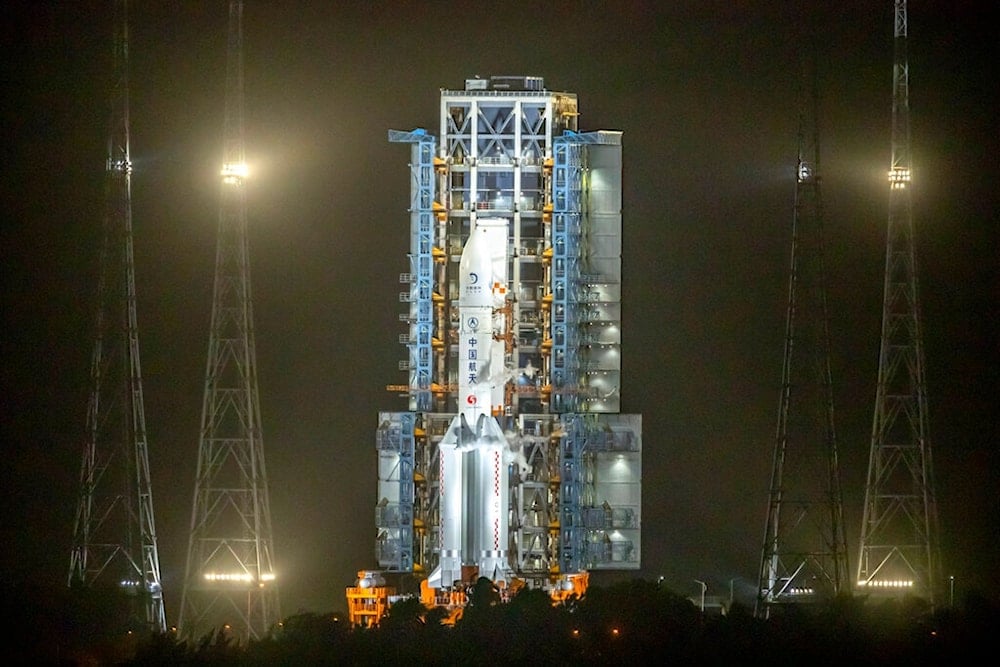NASA chief warns of China’s rising challenge in space race
Acting NASA chief Sean Duffy warned that China’s rapid lunar ambitions and structural advantages pose the toughest US space challenge since the Cold War.
-

A Long March-5 rocket sits on the launch pad at the Wenchang Space Launch Center in Wenchang in southern China's Hainan Province, early Tuesday, Nov. 24, 2020. Chinese technicians are making final preparations for a mission to bring back material from the moon's surface for the first time in more than four decades, an undertaking that could boost human understanding of the moon and of the solar system more generally (AP Photo/Mark Schiefelbein)
Acting NASA Administrator Sean Duffy has cautioned that the United States is confronting its toughest competition in space since the Cold War, pointing to China's rapid advances and ambitions to establish a base on the Moon.
"The stakes could not be higher. For the first time since the Cold War, the US faces a formidable rival in space. China is advancing plans for a lunar base," Duffy wrote Monday in an opinion piece for Fox News. He argued that Washington cannot allow Beijing to seize the upper hand in space capabilities, warning of "far-reaching implications for security and global leadership."
"America can't afford to let that happen," he added.
Push for reforms inside NASA
Duffy stressed that NASA must overhaul its internal operations in order to compete effectively. "NASA must be leaner, smarter and more mission-focused. Bloated bureaucracy, inefficiencies in contract procurement and a culture of overcaution have consistently grounded NASA missions," he said.
He singled out large-scale projects such as the Space Launch System and the Mars Sample Return, which he described as consuming enormous budgets while suffering repeated delays. "If we want to beat China to the Moon, we must move beyond bureaucratic box-checking. America no longer has the luxury of wasting time. If the technology is ready, launch it. If the innovation works, trust it," Duffy argued.
Global stakes in lunar competition
The NASA chief's remarks reflect growing unease in Washington over China's plans to expand its presence in space, with particular focus on the Moon. Beijing, together with Russia, is advancing the International Lunar Research Station (ILRS), a joint project aiming for a permanent base by 2035, and has already attracted multiple international partners. Analysts warn that this kind of space diplomacy could shift global alignments, giving China soft-power leverage alongside its technological edge.
Observers also point out that China has structural advantages: centralized planning, strong state funding, and the integration of military and civilian programs. This allows Beijing to execute ambitious missions quickly, such as its Chang'e lunar sample return and its historic far-side lunar landing, which the US has not matched. Meanwhile, NASA's Artemis program has been plagued by delays and cost overruns, raising concerns in Congress that the US risks "losing the Moon race to China."
At the same time, commercial space companies like SpaceX and Blue Origin provide Washington with a competitive edge, offering cheaper and faster launches and driving innovation. Duffy noted the importance of harnessing this private-sector momentum to keep the US ahead.
Beyond exploration: security implications
Military officials have echoed Duffy's warnings, speculating that China's expanding satellite constellations and anti-satellite capabilities could pose risks to US communications and navigation systems. Analysts say that if Beijing secures control of critical lunar infrastructure, it could establish strategic dominance in cislunar space, the area between Earth and the Moon.
Just last week, Duffy asserted that the United States remains ahead in space exploration and will do "everything" to complete the Mars Sample Return mission before China or any other country. But experts stress that unless NASA accelerates its timelines and trims bureaucracy, China's momentum could close the gap faster than Washington expects.
Read more: Politico: NASA head Duffy to fast-track nuclear reactor on the moon

 4 Min Read
4 Min Read








